The walk through the haphazardly planned township of Fadama is not a smooth one. You have to stop from time to time to scan the road to avoid stepping into wastewater on the ground due to lack of a proper drainage system.
Several child development center workers from the Church of Pentecost Fadama went into Fadama to identify impoverished children in the community to be registered into their new center.
As the four team members turned a corner, they collided with a little boy who had been angrily shoved out of a wooden structure that serves as a place where people go to buy food and eat. Such spots in Ghana are popularly called “chop bars.”
The boy was thin, in worn-out clothes and with no sandals to protect his feet from the filth on the ground. His name was Fred.
Fred is a 9-year-old-boy who lives with his 82-year-old grandfather, Steven, who is too old to do any work.
Food is hard to provide, so Fred sneaks into chop bars to eat leftovers from customers who don’t finish their food. He does this to the annoyance of the bartenders, who subject Fred to harsh treatment when they lay hands on him. Fred does not go to school because his grandfather cannot afford the school fees.
The grandfather, Steven, used to work as a domestic servant for expatriates until 1986, when that service was scrapped and he lost his job.
In 2003, he again got a job as a night watch with a private company, but could not do that for long due to his frequent poor health. Doctors advised him that it was bad for him at his age to work out in the open air at night. He stopped the job and has not had a job since.
Fred’s father died not long after he was born. His mother remarried, but the new husband does not want to have Fred in his home. The grandfather is the only relative who is willing to have Fred now.
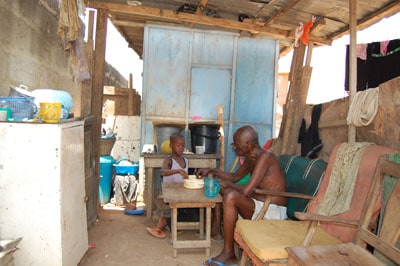
After the center workers saw his condition, Fred became the 148th child to be registered into their child development center. He has been enrolled in school and is in class/grade one. He attends the center regularly on Saturdays. Yet conditions did not immediately change much at home.
Food provision continues to be difficult. Granddad still does not earn any income. Sometimes the old man himself has to go to the center to get money from the workers before he can buy food for Fred and himself.
The center staff were worried about Fred’s condition at home, and wondered what they could do to make life better for him and his grandfather in the long term. Then Compassion’s Highly Vulnerable Children’s (HVC) Fund was introduced in Ghana.
The HVC Fund is an initiative through which assistance is given to children in critical situations — children facing devastating conditions that could end their lives or prevent them from growing and developing in the way that God wants them to.
The Highly Vulnerable Children’s Fund works with the poorest of the poor children. It helps children who are poor and need special attention and assistance in order to survive.
For example, HVC might help an orphan whose caregiver is too old, too sick or not in a condition to generate any income to sustain the child. Or some families are so large, sometimes as large as 10 children, with parents who are not gainfully employed, so food does not go around.
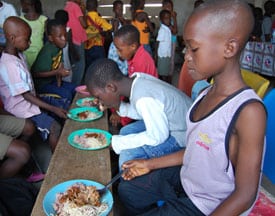 Compassion Ghana does not register more than two children from the same family, except in extremely special situations. This means that the once-a-week feeding on Saturday is not going to help a child in this situation that much.
Compassion Ghana does not register more than two children from the same family, except in extremely special situations. This means that the once-a-week feeding on Saturday is not going to help a child in this situation that much.
Children like this would need another intervention to bring them to the level of other children in the Child Sponsorship Program. That is where the Highly Vulnerable Children’s Fund comes in.
The HVC Fund provides children supplemental nutrition. This is intended to help the children eat regularly and get the nutrients their bodies need so that they can grow and develop well. Nutritious food will help them develop cognitively and perform well in their studies.
Every month, rather than giving the families money, the child is given food worth 20 Ghana cedis, which is about U.S.$143. From this money, the center buys nutritional food such as beans, eggs and milk for the child monthly.
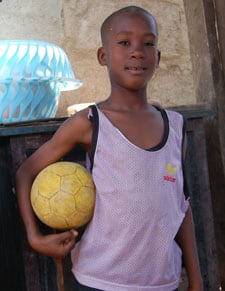 Fred receives food supplements every month. He is looking better physically, and is doing better at school.He can now speak a few words of English and does simple arithmetic. His favorite sport is soccer. The center gave him a soccer ball which he cherishes so much.
Fred receives food supplements every month. He is looking better physically, and is doing better at school.He can now speak a few words of English and does simple arithmetic. His favorite sport is soccer. The center gave him a soccer ball which he cherishes so much.
Another component of HVC is income-generation activities organized for caregivers to give them economic power so that they can also provide for the other needs of the children, apart from what Compassion is providing. It also enables them to take care of other children in the family who might not be in the sponsorship program. Without this, the little that is provided by Compassion would be spread among the rest of the family, which would still not be enough.
Caregivers are trained to identify things they can do to generate income, and are empowered with grant money with which they can start a trade. (The specific amount given to individual caregivers is still under discussion.)
Grandfather Steven is in the process of being helped by the center to start earning an income selling firewood. He is very grateful for what Compassion is doing for Fred.
“I know that I am very old and I do not have long to be there for my grandson. But it is my prayer that Compassion would continue to be there for Fred even when I am gone.
“I was there only in body for Fred, but it was Compassion who gave us hope.”

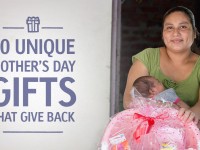

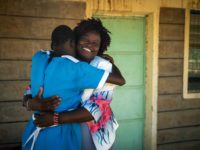
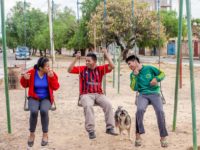


8 Comments |Add a comment
Thanks for the work done by compassion, may the good Lord award them abundantly
Compassion it is doing a great job! God keep blessing your projects.
Cintia
Pro-Adoption Advocate & Blogger
Blog: http://asavinglove.com
Twitter: @ASavingLove
God bless Grandfather Steven, and praise God for Compassion. When a need arises for which Compassion does not have a plan, they come up with one. God bless ’em all!
It’s really nice to hear all this stories and stop time reading them. It’s very important to remember that maybe next to us there are somebody with a big need and we can help somehow.
Blessings for all the Compassion Projects.
I love how Compassion has a plan for almost any situation.
Jennifer,
The Highly Vulnerable Children Fund is a Complementary Intervention (CIV). It complements the core programs (e.g., child survival, child sponsorship and leadership development) in our holistic child development model.
Other Complementary Interventions include our AIDS Initiative, Disaster Relief Program, Malaria Intervention Program, etc.
Here is another blog post about highly vulnerable children.
How does this fund differ from the CIV – Children’s Intervension Fund?
Wow..the grandfather’s quote at the end of the this entry is so powerful.
I’m so thankful Compassion is there for Fred and his grandfather!